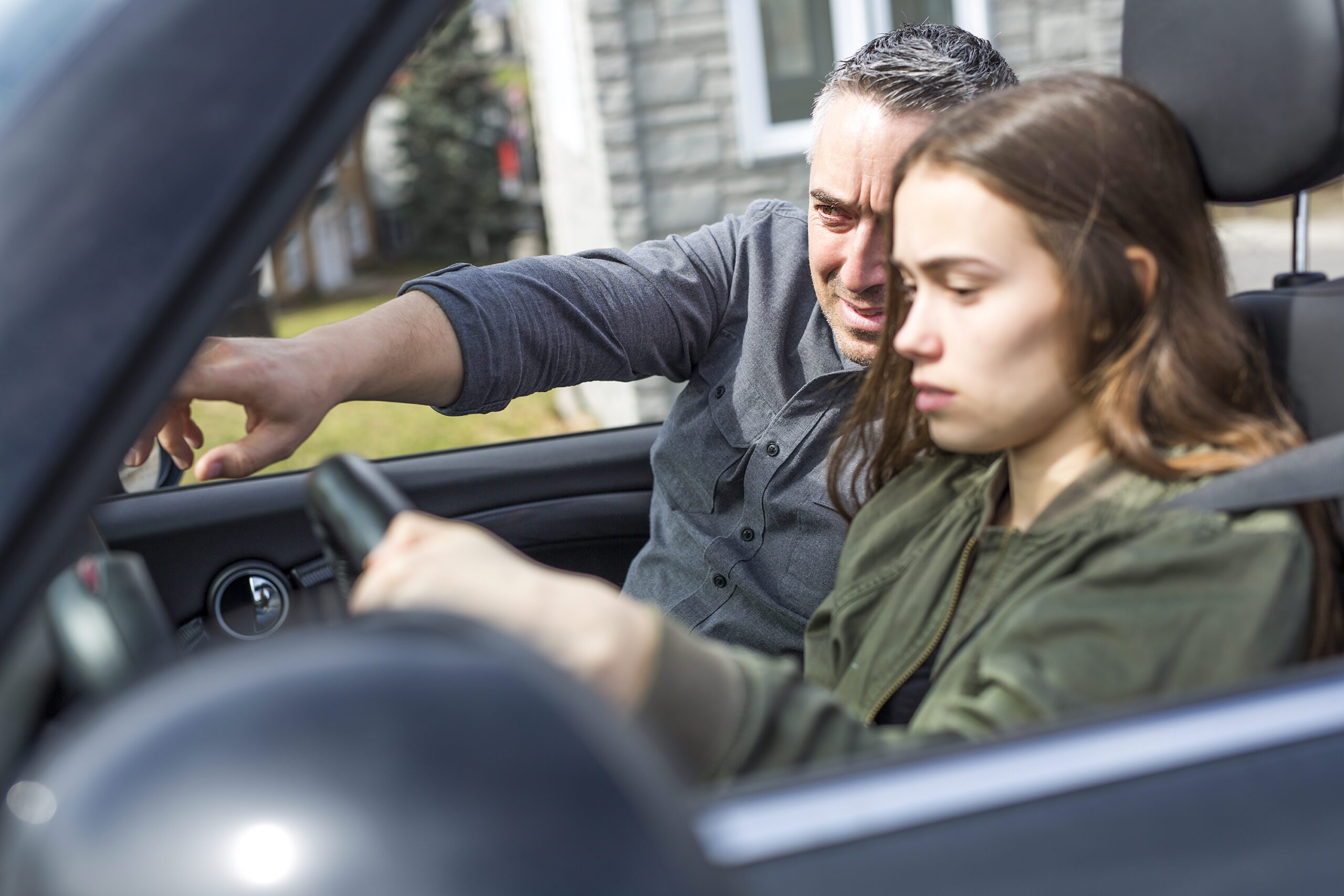
Courtesy of US Department of Transportation and FLTeenSafeDriver.org
National Teen Driver Safety Week is October 16–22, 2022! The U.S. Department of Transportation’s National Highway Traffic Safety Administration (NHTSA) is teaming up with local organizations to help empower parents to discuss the importance of driving safety with their young drivers.
Whether teens are driving a car, truck, or SUV, and whether they’ve just earned their license or have had it for a few years, the rules of the road stay the same. The greatest dangers for teen drivers are alcohol and other drug use, inconsistent or no seat belt use, distracted driving, speeding, and driving with passengers in the vehicle.
Review the following information to help teens stay safe behind the wheel.
Be Empowered to Set Driving Rules!
Remember: You’re a parent first. It is your responsibility to protect your adolescents. Use this motivation to keep your teen safer as they start navigating their new role as a driver.
Remind your teen that driving is a privilege, not a right.
As the parent, you’re in control. If your teen is following the rules of the road, the privilege to drive is theirs. If they aren’t following the rules of the road, they shouldn’t be freely given the keys to the car.
Have a conversation with your teen driver about driving laws and safe driving habits.
 Your desire to keep them safe never fades, so keep the lines of communication open at all times. Believe it or not, your teen is listening, and they depend on you to guide them and be there for them.
Your desire to keep them safe never fades, so keep the lines of communication open at all times. Believe it or not, your teen is listening, and they depend on you to guide them and be there for them.
Become familiar with your state’s nighttime driving restrictions, passenger restrictions, and all graduated driver licensing (GDL) restrictions in your state.
Surveys show that teens with parents who set and enforce firm rules for driving typically report engaging in fewer risky driving behaviors and being involved in fewer crashes. By knowing and enforcing the laws with your teen, you proactively promote safer driving for all road users.
The responsibility for safe road behavior is shared: Be a good role model for your teen driver by demonstrating your own safe driving habits.
Talk to your teen about cell phone use while in the car.
Encourage them to stow their phones while driving, designate a texter or navigator, or pull over before answering phone calls, texting, or engaging with any social media apps. Remind your teen that it’s not acceptable to record themselves or post on social media while driving.
Know the Facts About Teen Driver Fatalities
Motor vehicle crashes are a leading cause of death for teens (15-18 years old) in the United States.
In 2020, there were 2,276 people killed in crashes involving a teen passenger vehicle driver (15-18 years old), of which 748 deaths were the teen driver.
Parents: You can be the
the biggest influence on your teen’s choices
when they are behind the wheel.
Take the time to have a conversation about some of the biggest driving risks for teens, including:
 Impaired Driving: All teens are too young to legally buy, possess, or consume alcohol. However, nationally, in 2020, 19% of teen passenger vehicle drivers involved in fatal crashes had alcohol in their system. But alcohol isn’t the only substance that can keep your teen from driving safely: Like other drugs, marijuana affects a driver’s ability to react to their surroundings. Driving is a complex task, and marijuana slows reaction time, affecting a driver’s ability to drive safely.
Impaired Driving: All teens are too young to legally buy, possess, or consume alcohol. However, nationally, in 2020, 19% of teen passenger vehicle drivers involved in fatal crashes had alcohol in their system. But alcohol isn’t the only substance that can keep your teen from driving safely: Like other drugs, marijuana affects a driver’s ability to react to their surroundings. Driving is a complex task, and marijuana slows reaction time, affecting a driver’s ability to drive safely.
Remind your teen that driving under the influence of any impairing substance — including illicit or prescription drugs, or over-the-counter medication — could have deadly consequences.
It is critical that teen drivers understand that driving impaired can have consequences, that strict penalties may apply, that they may lose their license if they are caught driving impaired, and that they will face additional consequences for breaking rules they agreed to follow when they started driving.
Seat Belts: Wearing a seat belt is one of the simplest ways for everyone to be safe in a vehicle. Yet too many teens aren’t buckling up. In 2020, 52% of the teen passenger vehicle drivers who died in crashes were unbuckled. Even more troubling, when the teen driver involved in the fatal crash was unbuckled, nine out of 10 of the passengers who died were also unbuckled.
In 2020, 52% of the
teen passenger vehicle
drivers who died in crashes
were unbuckled.
Distracted Driving: Distractions while driving are more than just risky — they can be deadly. In 2020, among teen passenger vehicle drivers involved in fatal crashes, 7% were reported as distracted at the time of the crash.
Speeding: In 2020, almost one-third (31%) of all teen drivers of passenger vehicles involved in fatal crashes were speeding at the time of the crash, and males were more likely to be involved in fatal crashes than females.
Passengers: Teen drivers transporting passengers can lead to disastrous consequences. Research shows that the risk of a fatal crash goes up dramatically in direct relation to the number of passengers in a vehicle. The likelihood of teen drivers engaging in risky behavior triples when traveling with multiple passengers.
Remember The Rules Of The Road
1. Don’t Drive Impaired.
Set a good example by not driving after drinking or consuming marijuana or other impairing substances. Remind your teen that drinking before the age of 21 is illegal, and alcohol and/or marijuana and driving don’t mix, no matter your age.
Also, remind them that driving under the influence of any impairing substance — including illicit, prescription, or over-the-counter drugs — could have deadly consequences.
2. Buckle Up — Every Trip. Every Time. Everyone — Front Seat and Back.
Lead by example. If you wear your seat belt every time you’re in the car, your teen is more likely to follow suit. Remind your teen that it’s important to buckle up on every trip, every time, no matter what (both in the front and back seats), even while in taxis or ride-sharing services.
3. Keep Your Eyes on the Road, Hands on the Wheel, and Mind on the Driving Task.
 Remind your teen about the dangers of texting, dialing, or using mobile apps while driving. Require your young driver to put their phones away and to turn on the “Do Not Disturb” or similar phone features when on the road. Distracted driving isn’t limited to phone use; other passengers, vehicle audio and climate controls, and eating or drinking while driving are all sources of dangerous distractions when full time and attention should be given to driving. Know your state’s law regarding mobile phone and texting while driving restrictions; 49 states ban texting while driving for novice drivers. Parents, take note: These laws aren’t just for teen drivers.
Remind your teen about the dangers of texting, dialing, or using mobile apps while driving. Require your young driver to put their phones away and to turn on the “Do Not Disturb” or similar phone features when on the road. Distracted driving isn’t limited to phone use; other passengers, vehicle audio and climate controls, and eating or drinking while driving are all sources of dangerous distractions when full time and attention should be given to driving. Know your state’s law regarding mobile phone and texting while driving restrictions; 49 states ban texting while driving for novice drivers. Parents, take note: These laws aren’t just for teen drivers.
See Distracted Driving Law Chart. If your teen disobeys, enforce the penalties set with your teen before they started driving.
4. Obey All Posted Speed Limits.
Speeding is a critical issue for all drivers, especially for teens who lack the experience to react to changing circumstances around their cars. Obey the speed limit and require your teen to do the same.
5. Limit Other Teen Passengers
 Other teen passengers can present one of the biggest risks for your new teen driver. A study by the AAA Foundation for Safety found that the risk of a crash doubles with one additional teen passenger in the vehicle. Two additional teen passengers can increase the risk of a crash by 158%. Three additional teen passengers can increase the risk of a crash by 207%. The same study found that having at least one passenger aged 35 or older in a [teen-driven] vehicle was associated with a 62% decrease in the risk of a crash. Notably, not all of us have a spare 35-year-old laying around to chaperone each trip your teen driver may make. That’s okay! The easiest thing to do is to enforce limits on the number of teen passengers your new teen driver is allowed to have in the car. By setting clear guidelines and outlining the appropriate behavior for when your teen does have another teen passenger in the car, you can help mitigate their risk of being involved in a passenger distraction crash. Some examples of passenger boundaries can be: no loud music, no dancing or singing; avoiding having emotionally involved or dramatic conversations; no acting wild; all vehicle occupants must be wearing safety belts, etc.
Other teen passengers can present one of the biggest risks for your new teen driver. A study by the AAA Foundation for Safety found that the risk of a crash doubles with one additional teen passenger in the vehicle. Two additional teen passengers can increase the risk of a crash by 158%. Three additional teen passengers can increase the risk of a crash by 207%. The same study found that having at least one passenger aged 35 or older in a [teen-driven] vehicle was associated with a 62% decrease in the risk of a crash. Notably, not all of us have a spare 35-year-old laying around to chaperone each trip your teen driver may make. That’s okay! The easiest thing to do is to enforce limits on the number of teen passengers your new teen driver is allowed to have in the car. By setting clear guidelines and outlining the appropriate behavior for when your teen does have another teen passenger in the car, you can help mitigate their risk of being involved in a passenger distraction crash. Some examples of passenger boundaries can be: no loud music, no dancing or singing; avoiding having emotionally involved or dramatic conversations; no acting wild; all vehicle occupants must be wearing safety belts, etc.
Two additional teen passengers
can increase the risk of a crash by 158%.
Three additional teen passengers can
increase the risk of a crash by 207%
Don’t Call {them} When They’re Driving
Duh, right? It seems like it would be a no-brainer… However, 53% of teens who reported talking on a phone while driving were chatting with their mom or dad, according to a study by the American Psychological Association. One of the best things you can do to avoid this parental faux pas would be to enable location software (such as Google Location Sharing) to help identify when your teen may be driving. Most simply, if you know they are driving, don’t call them! Set a rule with your teen that they must notify you before and after they drive to their destination if they are traveling to places outside of their normal routine. Other driving apps, such as “Life 360,” can even tell you your teen driver’s speed, as well as other important driver metrics*.
*This is not an endorsement of any driver safety app or product, merely a suggestion of tools that the author found helpful for monitoring.
Engage In Safe Driving Conversations Year-Round
It is never too early, or too often, to discuss safe driving habits with your teen. You may choose to start the conversation during National Teen Driver Safety Week, but don’t be afraid to continue the conversation every day throughout the year. Even if it seems like they’re tuning you out, keep reinforcing these rules. They’re listening—your constant reminders about these powerful messages will get through.
Get creative!
Having a conversation is just one way to discuss safe driving. You can also write your teen a letter, send email or text reminders, leave sticky note reminders in the car, or use social media to share your messages.
Get it in writing.
Create a parent-teen driving contract that outlines the rules and consequences for your teen driver. Hang the signed contract in a visible place as a constant reminder of the rules of the road.
If you and your teen are going somewhere together, let your teen drive.
This is a great time for you to evaluate their driving progress and to discuss safe driving habits. Make sure your teen is following the rules you’ve set.
Finally, be empowered.
Driving—for everyone, teen and adult alike—is a privilege, not a right. If your teen is having a difficult time following the rules, it may be time to take away the keys and review the basics. Safe teen drivers can mean the difference between life and death — for themselves, their passengers, and all other road users.
What To Do If You Are In A Car Accident While Traveling In Florida
1. Call the police and file a report
2. Swap information (including any insurance info they may have)
3. Gather details
4. Take pictures
5. Gather contact information of any witnesses
6. Seek medical care immediately for any injuries – no matter how minor you think they might be.
GET MORE HELPFUL INFORMATION ON WHAT TO DO AFTER AN ACCIDENT HERE AT OUR “Car Wreck Checklist” >
Joe Zarzaur is a Board Certified Civil Trial Attorney whose firm is dedicated to promoting community safety since 2007. ZARZAUR LAW’S AREAS OF PRACTICE: Serious Personal Injury, Product Defect, Auto Accidents, Cycling Accidents, Motor Vehicle Accidents, Products Liability, Wrongful Death, Community Safety, Boat and Jet Ski Accidents, Slip and Fall Injuries, and more. Licensed in Alabama and Florida.
If you’ve been injured in a car accident, it’s important that you don’t make any rash decisions. Put yourself in the best possible position to receive the justice you deserve. It is also important to consult with a Board-Certified Trial Lawyer who has the knowledge and experience to help you. We know accidents can be stressful and want to make the process as easy as possible for you. Call Zarzaur Law, P.A. today at (855) Hire-Joe, or by requesting a free case review through our website.
|
https://flteensafedriver.org/safe-driving-tips-for-parents/
https://www.transportation.gov
https://www.trafficsafetymarketing.gov/get-materials/teen-safety/national-teen-driver-safety-week